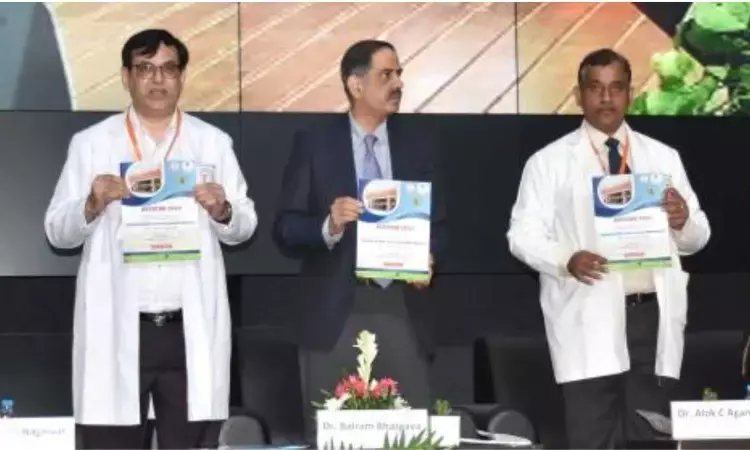- Home
- Medical news & Guidelines
- Anesthesiology
- Cardiology and CTVS
- Critical Care
- Dentistry
- Dermatology
- Diabetes and Endocrinology
- ENT
- Gastroenterology
- Medicine
- Nephrology
- Neurology
- Obstretics-Gynaecology
- Oncology
- Ophthalmology
- Orthopaedics
- Pediatrics-Neonatology
- Psychiatry
- Pulmonology
- Radiology
- Surgery
- Urology
- Laboratory Medicine
- Diet
- Nursing
- Paramedical
- Physiotherapy
- Health news
- Fact Check
- Bone Health Fact Check
- Brain Health Fact Check
- Cancer Related Fact Check
- Child Care Fact Check
- Dental and oral health fact check
- Diabetes and metabolic health fact check
- Diet and Nutrition Fact Check
- Eye and ENT Care Fact Check
- Fitness fact check
- Gut health fact check
- Heart health fact check
- Kidney health fact check
- Medical education fact check
- Men's health fact check
- Respiratory fact check
- Skin and hair care fact check
- Vaccine and Immunization fact check
- Women's health fact check
- AYUSH
- State News
- Andaman and Nicobar Islands
- Andhra Pradesh
- Arunachal Pradesh
- Assam
- Bihar
- Chandigarh
- Chattisgarh
- Dadra and Nagar Haveli
- Daman and Diu
- Delhi
- Goa
- Gujarat
- Haryana
- Himachal Pradesh
- Jammu & Kashmir
- Jharkhand
- Karnataka
- Kerala
- Ladakh
- Lakshadweep
- Madhya Pradesh
- Maharashtra
- Manipur
- Meghalaya
- Mizoram
- Nagaland
- Odisha
- Puducherry
- Punjab
- Rajasthan
- Sikkim
- Tamil Nadu
- Telangana
- Tripura
- Uttar Pradesh
- Uttrakhand
- West Bengal
- Medical Education
- Industry
Data-Driven scientific studies needed for Antimicrobial Resistance post COVID-19 pandemic

'India is providing 60% of generic drugs and 60% of total vaccines across the globe. Every 6th doctor and every 5th nurse is from India. Our healthcare institutions have resources and infrastructure to boost the research to develop newer solutions during challenging times, he said.
Raipur: The fourth National Conference and Workshop on Antimicrobial Stewardship in India, 'ASPICON-2022', was inaugurated in All India Institutes of Medical Sciences on Sunday.
Experts from premier medical institutions stated that there is an increase in antimicrobial resistance post-COVID-19 and asked for more data-driven studies, specifically from the Indian perspective.
Also Read:Sustained rise in antimicrobial resistance in India: ICMR study
Padma Shri Prof. (Dr.) Balram Bhargava termed the Indian healthcare revolution as one of the most incredible things that happened during the last 75 years and urged Indian healthcare professionals to lead the world in combating the pandemic.
While inaugurating the Conference 'Bad Bugs, No Drugs: Time to Escalate AMSP Measures', Chief Guest Prof. Bhargava discussed a comprehensive view on the topic 'India Fights COVID-19: Unfolding Challenges and Facts'. Prof. Bhargava said that apart from IT, the Mobile revolution, or Bollywood and cricket, there are numerous other fields to which India has contributed tremendously. It includes space science, nuclear program, green revolution, white revolution, blue revolution, and healthcare facilities provided in remote areas during the COVID-19 pandemic.
'India is providing 60% of generic drugs and 60% of total vaccines across the globe. Every 6th doctor and every 5th nurse is from India. Our healthcare institutions have resources and infrastructure to boost the research to develop newer solutions during challenging times, he said.
Prof. Bhargava elaborated on India's tryst with COVID-19 from the very beginning of 2019 up to 2022. 'Strong Indian leadership gave calibrated, proactive, pre-emptive, and graded responses to test-track and treat COVID-19. It resulted in the countrywide scaling up of diagnostic labs from one to more than 3000 within a year, the production of diagnostic kits, and four rounds of Sero surveys. We have prepared treatment/diagnostic guidelines and public health advisories and designed innovative service delivery of vaccines through drones in remote areas. The challenging time of the pandemic has proved our vaccine manufacturing superpower, IT prowess, and citizen participation through self-help groups and local government, he said.
Prof. (Dr.) Nitin M. Nagarkar, Director, said that there is a need to conduct Indian-specific research in antimicrobial resistance after COVID-19. 'Young professionals should come forward and lead new research and development for the betterment of society, Prof. Nagarkar said. Earlier, Prof. Padma Das, Organizing Chairperson, welcomed all the guests. Organizing Secretary Dr. Tushar Jagzape presented a vote of thanks. The Conference discussed various aspects, including the Pharmacology perspective on AMSP: Antibiotic consumption and audits by Dr. Nusrat Shafiq from PGI Chandigarh and Antimicrobial Resistance increase in post-COVID-19 by Dr. Debabrata Dash from AIIMS, Manglagiri.
Prof. Bhargava, Prof. Nagarkar, and other guests also released a souvenir on this occasion. Prof. Nagarkar felicitated Prof. Bhargava during the Conference. The inaugural session and Different scientific sessions were attended by Prof. Alok C. Agrawal, Dean (Academics), Prof. Vinay R. Pandit, Prof. Anudita Bhargava, and Dr. Ujjwala Gaikwad along with 500 delegates from across the country in hybrid mode.
Also Read:Only 30% snakebite victims in India reach hospitals: ICMR Study
Kajal Rajput joined Medical Dialogues as an Correspondent for the Latest Health News Section in 2019. She holds a Bachelor's degree in Arts from University of Delhi. She manly covers all the updates in health news, hospitals, doctors news, government policies and Health Ministry. She can be contacted at editorial@medicaldialogues.in Contact no. 011-43720751


